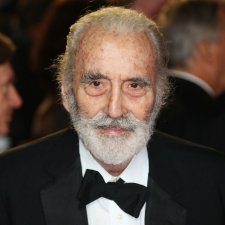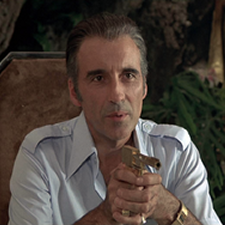 The JBIFC is very sad to report that Sir Christopher Lee, immortalised in classic films ranging from Dracula and The Wicker Man through to James Bond and the Lord of the Rings trilogy, has died at the age of 93. He was very much part of the Bond universe as he was a cousin of Bond author Ian Fleming and also played the role of devious assassin Francisco Scaramanga in The Man With The Golden Gun (1974), Roger Moore’s second adventure as 007.
The JBIFC is very sad to report that Sir Christopher Lee, immortalised in classic films ranging from Dracula and The Wicker Man through to James Bond and the Lord of the Rings trilogy, has died at the age of 93. He was very much part of the Bond universe as he was a cousin of Bond author Ian Fleming and also played the role of devious assassin Francisco Scaramanga in The Man With The Golden Gun (1974), Roger Moore’s second adventure as 007.
The veteran actor passed away on Sunday morning (June 7) at Chelsea and Westminster Hospital in London, but his wife, the former Danish model Birgit Kroencke, took the decision to hold back the sad news for four days until all the family members and his close friends were informed.
Sir Christopher, who served in the Special Forces in World War Two and was also an accomplished opera singer, was knighted for his services to drama and charity in 2009, and was also awarded a BAFTA Fellowship for his services to film and entertainment in 2011. His career in movies spanned seven decades, bringing him international recognition and legions of loyal fans.
Sir Roger Moore, who played 007 opposite Sir Christopher in Golden Gun, was among those who led the tributes, which have come from across a broad spectrum of the movie, musical, and entertainment worlds, and even included the UK’s Prime Minister.
In Praise of Lee
Sir Christopher was born in Belgravia in London in 1922, the son of a British military father and an Italian aristocratic mother. After the break-up of his parents marriage, he spent some of his childhood in Switzerland along with his mother. When they returned to England, he was educated at Wellington College in Berkshire, and seemed destined to enter diplomatic service. However, when his education ended abruptly at 17, he ended up with a low-paid job as a City clerk instead. In World War Two, he served as an Intelligence Officer with the Royal Air Force (RAF) in north Africa and Italy and, towards the end of the War, he was seconded for a while to a unit which investigated war crimes.
After the war, with his distinctive height (6ft 4in) and excellent baritone voice, he was encouraged by one of his Italian relatives to think about working in the film industry. While his parents believed his looks were not quite right for a screen career, Lee ended up with a seven-year contract with the Rank Organisation. Ironically, director Terence Young (who went on to direct three Bond movies in the 1960s) gave Lee his first chance to display his talents on screen in Corridor of Mirrors (1948). Over the next ten or so years, he took roles in a variety of mainly low-budget British films. He worked hard, and by the later 1950s already had 50 film appearances on his C.V. In 1957, he made his big ‘break-through’, when he was signed by Hammer Films, which was embarking on a series of movies based on the classic gothic horror novels.
His first appearance for Hammer saw him as the ‘Creature’ in The Curse of Frankenstein, opposite Peter Cushing, who became a close friend. He never looked back: a year later came Dracula, which also starred Cushing as van Helsing. Lee, who actually spoke very little in the movie, still managed to convey tremendous screen presence as the evil vampire and, in many ways, dominated the story.
It was the making of Lee, and there followed a series of Hammer horror roles, including six more outings the evil vampiric Count. In 1973, Lee took a role in the relatively low-budget film The Wicker Man, which he often referred to as his best performance on screen. The movie has become something of a cult classic over the years.
The Man Who Had Some Fun
Increasingly determined to take his screen career in new directions, in 1974 Lee took the role of Francisco ‘Pistols’ Scaramanga, the main villain in Ian Fleming’s last full novel The Man With The Golden Gun, which was published posthumously in 1965. It was, in a sense, second time lucky for Lee when it came to the world of James Bond. Lee, who was a (step) second cousin of Bond creator Ian Fleming, had been a regular golf partner with the 007 author. Fleming had once told Lee that he had Lee in mind when he created the role of Dr. Julius No for his sixth Bond novel, and he said he was going to suggest Lee for the role of Julius No in the movie version (a part taken in the end, of course, by Joseph Wiseman).
take his screen career in new directions, in 1974 Lee took the role of Francisco ‘Pistols’ Scaramanga, the main villain in Ian Fleming’s last full novel The Man With The Golden Gun, which was published posthumously in 1965. It was, in a sense, second time lucky for Lee when it came to the world of James Bond. Lee, who was a (step) second cousin of Bond creator Ian Fleming, had been a regular golf partner with the 007 author. Fleming had once told Lee that he had Lee in mind when he created the role of Dr. Julius No for his sixth Bond novel, and he said he was going to suggest Lee for the role of Julius No in the movie version (a part taken in the end, of course, by Joseph Wiseman).
In many ways, the casting of Lee as Scaramanga in 1974 was an inspired piece of casting. Critics of the movie, while less enthusiastic about the film as a whole, still heaped praise on Lee’s performance, and Lee had clearly relished the role. Lee said later that Scaramanga was a ‘marvellous part’, and added: ‘I had great fun making it’.
In one interview, given to The Times newspaper, Lee explained how, with the aid and support of director Guy Hamilton, his role as Scaramanga had been further developed: ‘When I first read the script I visualised Scaramanga as a straight-down-the-middle heavy’. He noted that Scaramanga was not one of Fleming’s most impressive murderers: ‘Ian was already ill when he wrote Golden Gun and I think he knew that the wells of his imagination were beginning to run a bit dry. So Guy and I, after a lot of talk, decided to make Scaramanga a little bit like Bond himself, a counter-Bond if you like, instead of the murderous, unappetising thug of the novel’.
In another interview, Lee once explained: ‘I saw Scaramanga not as a madman or a cold character but as a very human person – and a very inhuman person in many ways’. Lee very much wanted to portray the golden gunned assassin as much more than the straightforward hardman that Fleming had originally described in his last novel: instead, Lee wanted to convey a man who was a complex combination of the lethal and the charming, a sophisticated killer who was highly paid and who, like Bond, enjoyed the best things in life.
This certainly came across on the screen, and Lee’s Scaramanga remains something of a favourite villain among fans of the Roger Moore James Bond films and, indeed, the 007 franchise generally.
Sir Christopher Lee, 1922-2015. R.I.P.
